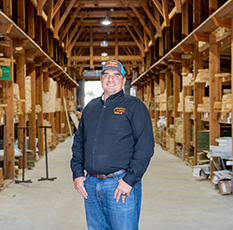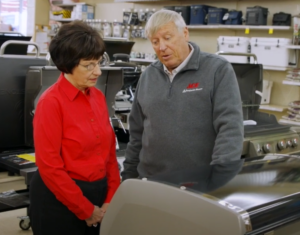
Scalability of Retail Technology is Key to Growing a Small Business
There’s an axiom in retail that says, “If your business isn’t growing, it’s dying.” And one of the universal components of growing a business in the 21st century is having the appropriate technology with which to start, run and grow. That’s why the scalability of any store’s retail management system is so important.
- Today, 93% of small-business owners use at least one tech platform or tool to run their business, and 80% say technology “helps them have more time to spend away from their businesses and with their family.” – U.S. Chamber of Commerce
- Identify your technology needs for a business designed for steady growth with potential new target customers, business models, and/or more reach across regions, states, or countries. – SCORE, a resource partner of the U.S. Small Business Administration (SBA).
- Scaling can also improve the overall efficiency of a business by streamlining processes and implementing new technologies. It can lead to cost savings, increased productivity and overall better performance. Improving efficiency is crucial in scaling because as your business grows, you must ensure that everything runs smoothly and effectively. – LinkedIn
The past three years, starting with the pandemic, have demonstrated just how important it was to have functioning and scalable retail technology. Businesses that had it survived and many flourished. Many of those that didn’t failed.
Getting started
Dennis Gamble was not new to business when he purchased Tri-County Hardware and Farm Supply in 2008. He had partnered with his brother in three hardware stores many years earlier, ran a residential construction company, and had a real estate agency with his sons. But doing retail in the 21st century was new, especially when it came to retail technology.
“I’m an old codger – not very tech-minded. And, of course, I resisted change. I wanted to (keep doing business) in the shoebox,” Dennis says with a laugh, adding he was so resistant to change that “the system sat on the floor for darn near a year before we got into it. But once we did, we love it.”
Tri-County went from a struggling little store to one that now grosses over $1 million annually and he credits his move to a modern point-of-sale system as the catalyst for its growth.
“This has been a labor-saver for me. The way the accountant wanted our paperwork, it was labor-intensive to put together,” he explains. “When we wrote our charge tickets by hand, somebody manually had to put them in the computer … Now, it’s all done at the front desk. It cut a lot of hours out of my week.”
Growing
Sam Olson was still in college when he and his parents purchased Buffalo Hardware in Buffalo, South Dakota. Sam quickly turned that store into the foundation of a multipronged retail company. He now also owns and operates Buffalo Ranch Supply, Olson Propane, and Olson Fuels.

Sam Olson’s enterprise grew from a single hardware store and lumberyard to include separate ranch supply, fuel and propane businesses.
Taking over Buffalo Hardware was almost like starting from scratch. He remodeled the store, refurbished the exterior, and expanded the greenhouse and lumberyard. The previous owner operated with a cash register, pen and paper. So, Sam not only had to update the technology, but he also had to implement an entirely new business operating plan. He credits solid planning and his investment in retail technology for much of his success.
“We started the business my senior year of college and the first order of business was to find a point-of-sale system to run it on,” he explains. “My goal was to make sure we had a system that would take us into the future. We had to have the technology to help us succeed. You don’t change systems every year, so we made sure we made the right decision.”
Sam’s decision to get his hardware store started on a solid foundation with retail technology allowed him to expand his reach and open three other businesses.
“It was just a natural fit for me being able to use Paladin to sell these other products,” he says. “The data you get from it is so clean, easy to get to, and easy to use. It has improved our processes in preparing quotes and filling orders.”

Jim and Dianne Byrum started with a single hardware store in Leslie, Michigan. They now have seven stores and manage them all with technology from Paladin Data Corporation.
Managing multiple locations
Jim Byrum spent much of his career in corporate sales and also represented Michigan’s agricultural interest in private, state and federal agencies. However, it was a frustrating visit to a hardware store in Leslie, Michigan that led him into retailing. Over the years, Jim’s business grew. He now owns six stores across central Michigan and runs them all on the same retail management system.
“Over the last 20, 30 years there’s been a real loss of small-town hardware stores, and the lack of modern technology, I think, is one of the reasons. The demand for technology by retailers for a number of reasons, and the need for speed at the point of sale has changed so much over the past few years, I don’t know how stores operate without it.”
He runs all his stores independently and all but Gregory Hardware are under the Byrum Ace Hardware brand.
“(The system) needed to do the kinds of things we wanted to do – quick point of sale, smooth payment processing. A lot of the people we contacted were very complimentary of Paladin. We wanted good customer service and support, and the Paladin team did everything they could to make it an easy transition. As we have added stores, the same commitment to meet our needs and handle a smooth installation process has always been a priority.”
Upshot
No matter what level of retail you’re at – just starting, expanding your store, or adding locations – having a retail management system that can grow with you is incredibly important. Like Sam Olson said: “You don’t change systems every year, so we made sure we made the right decision.”
